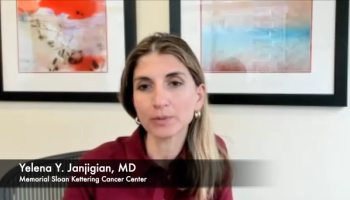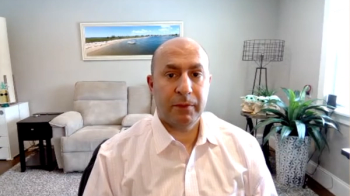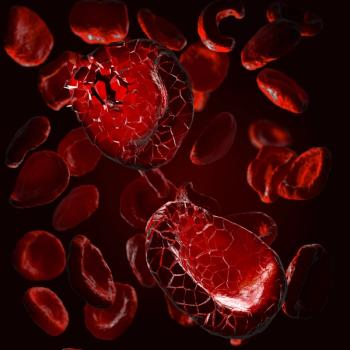
Kohie Shitara, MD, spoke about the use of immunotherapy in the first-line setting for metastatic gastric cancer.

Your AI-Trained Oncology Knowledge Connection!


Kohie Shitara, MD, spoke about the use of immunotherapy in the first-line setting for metastatic gastric cancer.

The phase KEYNOTE-716 trial, which assessed the use of adjuvant pembrolizumab in patients with resected stage IIB and IIC melanoma, met its secondary end point of distant metastasis-free survival.

Post-resection survival could be predicted by FAM46C expression in patients with gastric adenocarcinoma.

In a presentation at 2022 IGCC, Ju-Seog Lee, PhD, discussed an analysis that combined tumor classification models to derive new prognostic subgroups in gastric cancer.

Laparoscopic proximal gastrectomy led to less vitamin B12 supplement use than total gastrectomy without negatively impacting survival for upper third early gastric cancer.

A significant improvement in overall survival was observed in patients with high-risk bladder cancer who achieved radical cystectomy–pentafecta.

A supplemental new drug application for ivosidenib plus azacitidine was granted priority review by the FDA for previously untreated patients with IDH1-mutant acute myeloid leukemia.

The addition of prostate radiation therapy to androgen deprivation therapy appears to be cost effective in patients with low-volume metastatic hormone-sensitive prostate cancer.

In patients with postmenopausal breast cancer treated with tamoxifen and 2 to 3 years of letrozole, an additional 5-years of letrozole yielded an improvement in disease-free survival.

Yelena Y. Janjigian, MD, spoke about using immunotherapy to treat localized gastric cancer.

Compared with a wait-list control group, mindful awareness practices and survivorship education significantly reduced depressive symptoms from preintervention to postintervention in younger survivors of breast cancer.

Thomas Martin, MD, spoke about how the approval of ciltacabtagene autoleucel for patients with relapsed/refractory multiple myeloma may change the standard of care in this setting.

A recent study found women had a 2-fold higher mortality risk than men when being treated with immune checkpoint inhibitors for advanced melanoma.

NUC-1031 plus cisplatin was unlikely to reach a primary end point of improved overall survival in advanced biliary tract cancer, leading to the discontinuation of the phase 3 NuTide:121 trial.

Based on results of the phase 3 CheckMate-816 trial, the FDA granted approval to the combination of nivolumab plus platinum-doublet chemotherapy for the treatment of non–small cell lung cancer prior to surgery.

Ruben Mesa, MD, spoke about why pacritinib in the treatment of myelofibrosis is beneficial.

In an interview with CancerNetwork®, Thomas G. Martin spoke about how the approval of ciltacabtagene autoleucel will likely dramatically impact the standard of care for patients with relapsed/refractory multiple myeloma.

A clinical hold has been placed on the phase 1b CYAD-101-002 trial, examining pembrolizumab after treatment with CYAD-101 and folinic acid, fluorouracil, and oxaliplatin preconditioning in metastatic colorectal cancer.

Patients treated with ceritinib who had ALK-positive non–small cell lung cancer with active brain metastases and/or leptomeningeal disease experienced encouraging responses in the phase 2 ASCEND-7 trial.

A significant progression-free survival benefit was observed with the use of capecitabine maintenance therapy in newly diagnosed nasopharyngeal carcinoma vs best supportive care.

At 2022 ASCO GU, Toni K. Choueiri, MD, discussed the CLEAR study and how East Asian patients with renal cell carcinoma derived similar benefit with lenvatinib plus pembrolizumab as the overall trial population.

Thomas Martin, MD, spoke about how to increase response durability with ciltacabtagene autoleucel for patients with heavily pretreated multiple myeloma.

Following a submission of updated survival data, the FDA has extended the Prescription Drug User Fee Act date for ublituximab/umbralisib in chronic lymphocytic leukemia and small lymphocytic lymphoma.

Treatment with a hypomethylating agent plus venetoclax followed by hematopoietic stem cell transplant could improve outcomes in patients with treated secondary acute myeloid leukemia.

Topline findings from the phase 3 SIENDO trial did not appear to likely support a supplemental new drug application use of selinexor in patients with advanced or recurrent TP53 wild-type endometrial cancer, prompting the creation of a new phase 3 trial to support a future submission.

Elderly patients with multiple myeloma who were treated with first-line bortezomib had a higher risk of falls vs age-matched controls.

Ruben Mesa, MD, spoke about which patients stand to benefit the most from the approval of pacritinib in myelofibrosis with severe thrombocytopenia.

Eleni Efstathiou, MD, PhD, spoke about how results of the phase 3 MAGNITUDE trial, which examined the combination of niraparib with abiraterone acetate and prednisone, have the ability to change the standard of care in patients with metastatic castration-resistant prostate cancer.

Patients with squamous cell carcinoma of the head and neck who had progressive disease following treatment with platinum-based chemotherapy and a checkpoint inhibitor experienced promising safety and preliminary efficacy following treatment with tisotumab vedotin.

New findings indicate that mechanisms of genomic escape seen in covalent and some noncovalent Burton tyrosine kinase inhibitors could be responsible for drug resistance in relapsed/refractory chronic lymphocytic leukemia.